An analysis of Walmart and Walton activity in the current political cycle
In advance of the consequential 2024 U.S. elections, United for Respect seeks to shine a light on the political activity of the nation’s largest private-sector employer. We gathered and analyzed publicly available data on Walmart’s political activity in the current political cycle (2023-2024).
Key findings:
- Walmart and the Waltons have spent over $32 million on politics this cycle.
- Overall political spending favors Republicans over Democrats by more than five-to-one.
- Most Walmart and Walton spending—over $22 million—flowed into nominally “non-partisan” Issue PACs that fund conservative—sometimes extremely conservative—causes.
- Walmart and the Walton family have donated over $800,000 this election cycle to current and former Republican governors responsible for enacting draconian anti-abortion laws.
- Walmart and the Waltons have donated at least $885,900 to election deniers this cycle. More than one of every four candidate dollars (in areas where data are available) went to an election denier.
According to government filings, Walmart and the Walton family have invested over $32 million in direct political spending so far this election cycle (since January 1, 2023).
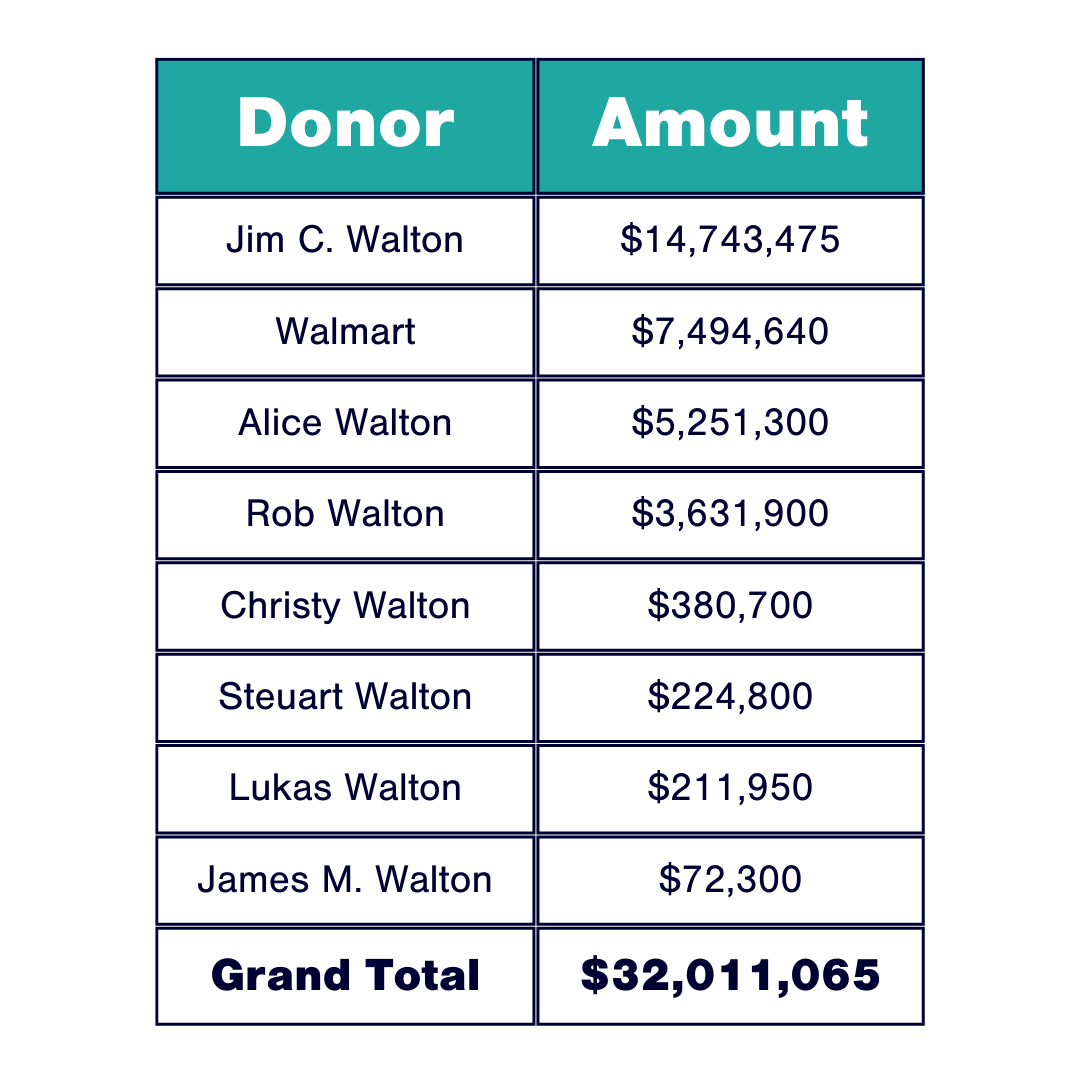
Less than ten percent of this money went directly to candidates—and a bit more than that went to political parties. A full three-quarters of all spending went to political action committees (PACs). PACs themselves may be aligned with parties (Party PACs), aligned with politicians (Leadership PACs), or dedicated to issues or ballot measures (Issue PACs).
Roughly 75 percent of all spending is directed to federal politics, with millions more spent at the state level.
Walmart and the Walton family spending favors Republicans. Of the $9.7 million in explicitly partisan spending, Republicans and Republican-aligned committees received over 83 percent. The extent of the lopsidedness varies depending on the type of recipient: spending on politicians “only” favored Republicans by a greater than two-to-one margin, while donations directly to parties favored Republicans by more than ten-to-one. Donations to Party and Leadership PACs favored Republicans by more than four-to-one.
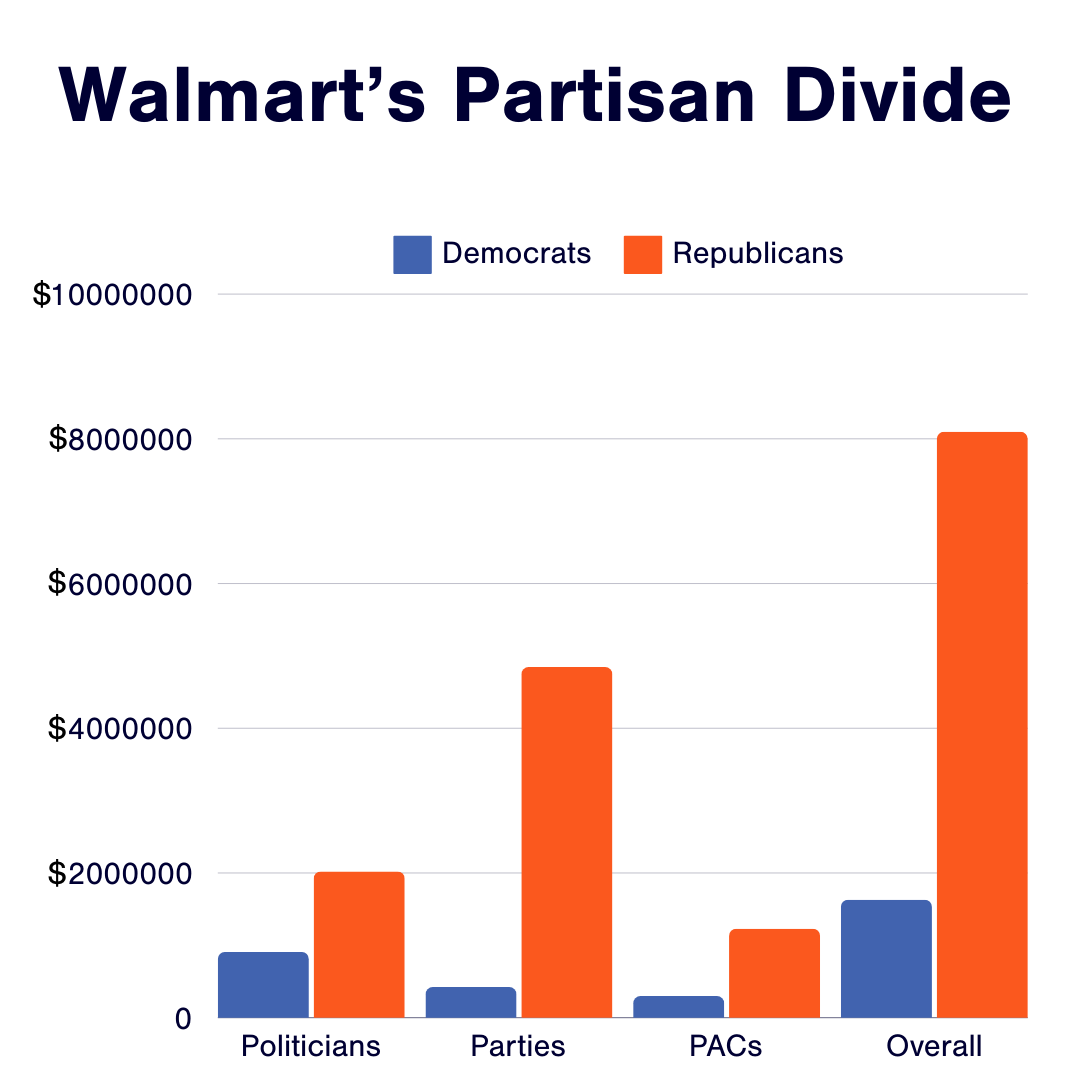
Most Walmart and Walton spending—over $22 million—flowed into Issue PACs. Though technically nonpartisan, millions ultimately went in direct support of Republicans anyway. Most of these Issue PACs fund conservative—sometimes extremely conservative—causes.
- Roughly two-thirds of all Issue PAC money went to a single right-wing organization. Americans for Prosperity, founded by the billionaire Koch brothers, has been likened to “a privatized political party” and is widely credited with the rise of the Tea Party movement. Jim Walton donated $10 million this cycle and Alice Walton donated $5 million.
- Walmart has put more than $3.5 million into a “tough on crime” measure through a committee called Californians for Safer Communities. Prop. 36 threatens to roll back criminal justice reforms and (according to the Los Angeles Times) “revive the disastrous war on drugs.” In a move that one academic expert called “surprising and perhaps unprecedented,” Californians for Safer Communities then donated $1 million to the California Republican Party.
- The company put $100,000 into a committee called Californians for Fair Pay and Employer Accountability, an effort to weaken a key legal tool for enforcing workers’ rights. After Walmart’s money helped the measure qualify for the ballot, state politicians negotiated business-friendly reforms to the Private Attorneys Generals Act.
- Jim Walton gave over $2 million to various pro-Charter school organizations including Legacy 44 PAC, Charter Public Schools Political Action Committee, and Charter Schools Now.
- Big Sky Action Fund is a Super PAC that raised just over $1 million—nearly all of it from Rob Walton. The Super PAC then turned around and donated nearly all of it to Conservative Values for Utah, a different Super PAC operating in support of U.S. Rep. John Curtis (R-UT).
- Various business and industry trade groups received about $129,000. Walmart donated to PACs associated with the Retail Industry Leaders Association, National Retail Federation, American Trucking Association, National Association of Chain Drug Stores, and others.
- The remaining money—a little less than $300,000 in total—went to a hodgepodge of causes supported by Walmart (voting, mental health, veterans), Christy Walton (reproductive health), and Lukas Walton (environmental).
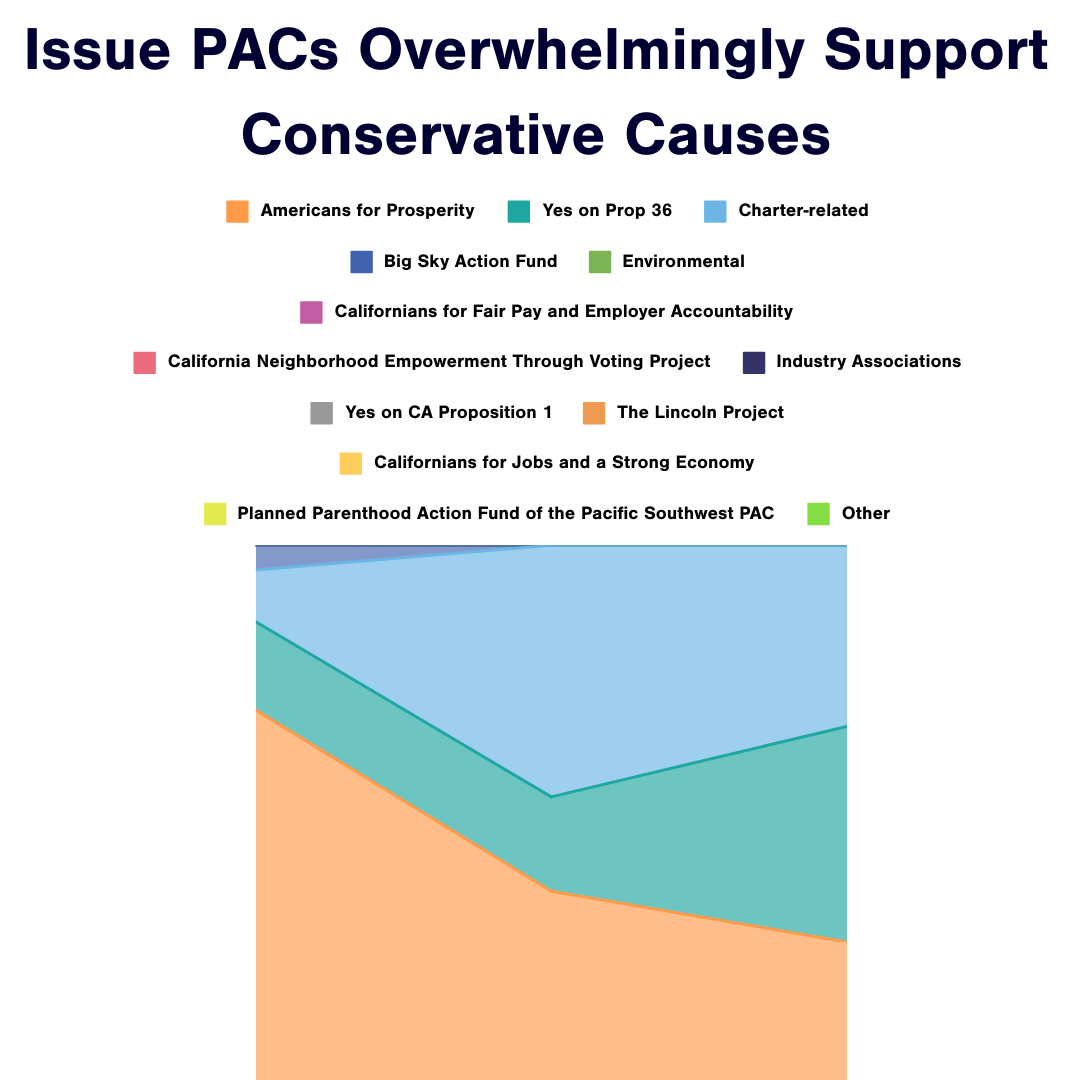
Although there is often overlap among the recipients of their largesse, contributions from Walmart (as a corporate entity) and those of the Walton family follow different patterns.
While most Walton family giving (90 percent) is at the federal level, most company giving (75 percent) is at the state level.
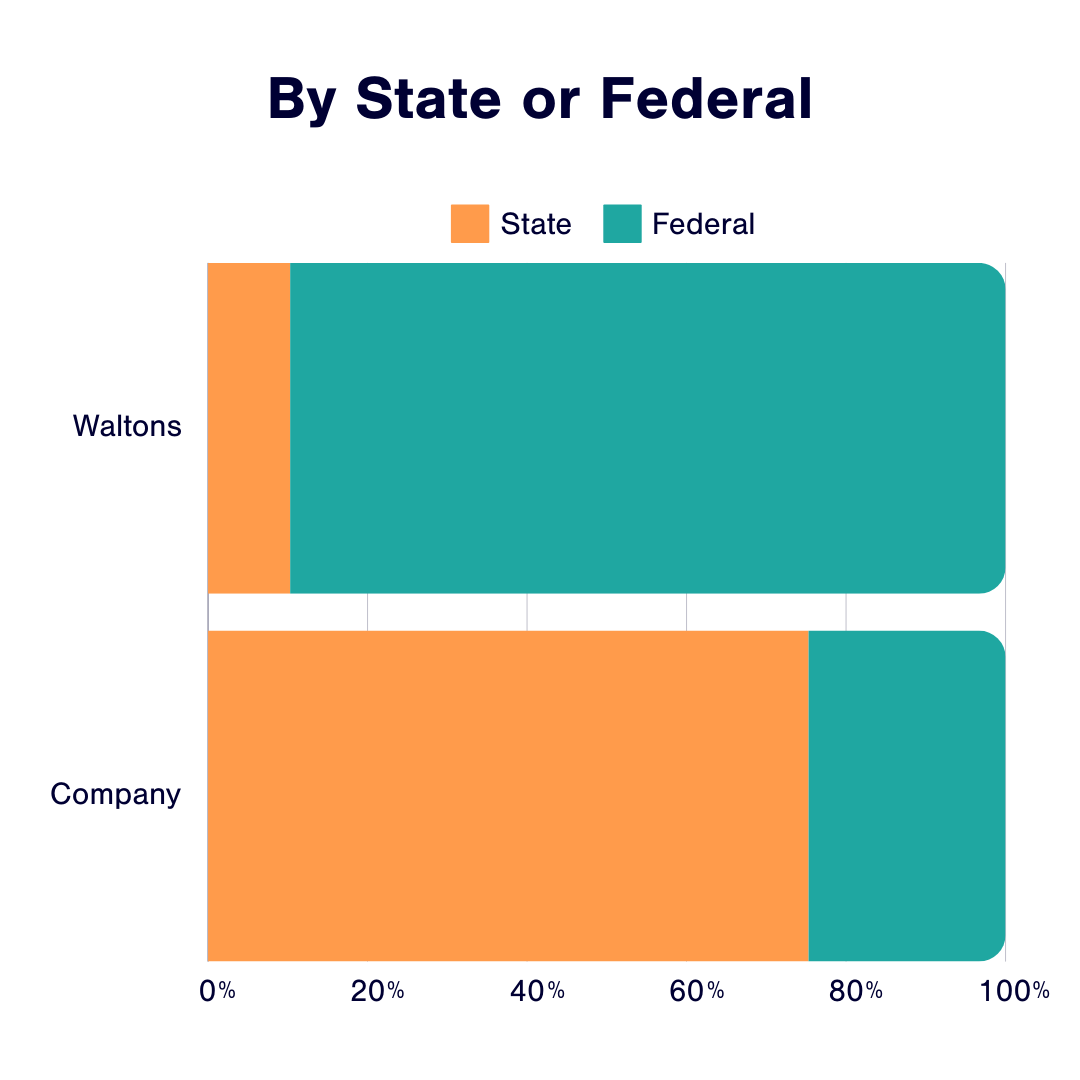
Both Walmart and the Waltons funnel most of their giving through PACs (58 percent and 79 percent, respectively). Direct donations to politicians make up a significantly larger share of the company’s overall appropriations—29 percent vs. just 3 percent for the Waltons.
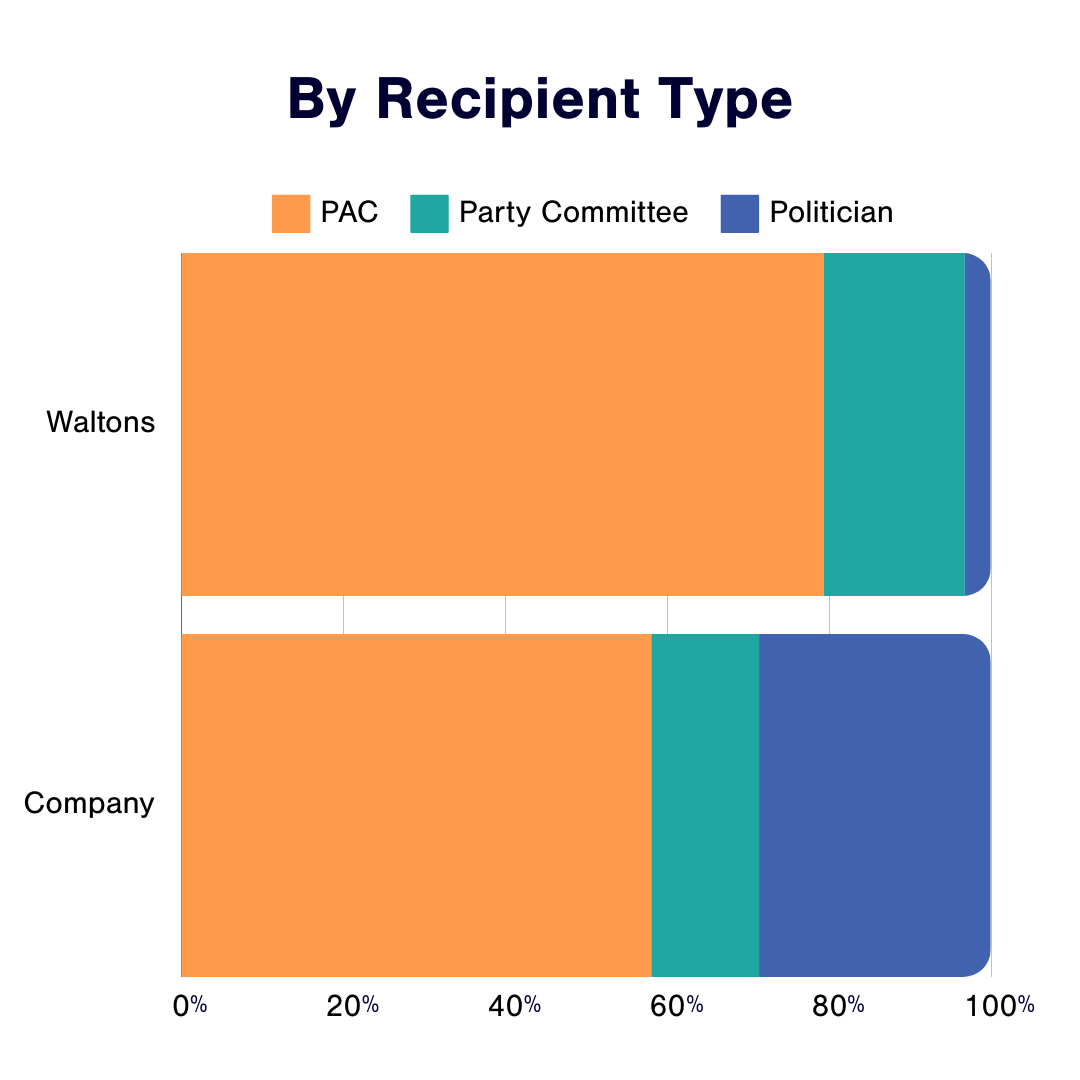
Of explicitly partisan giving, the Walton family favors Republicans by greater than 13-to-1. By contrast, Walmart’s corporate giving is a (relatively) more balanced two-to-one in favor of Republicans.
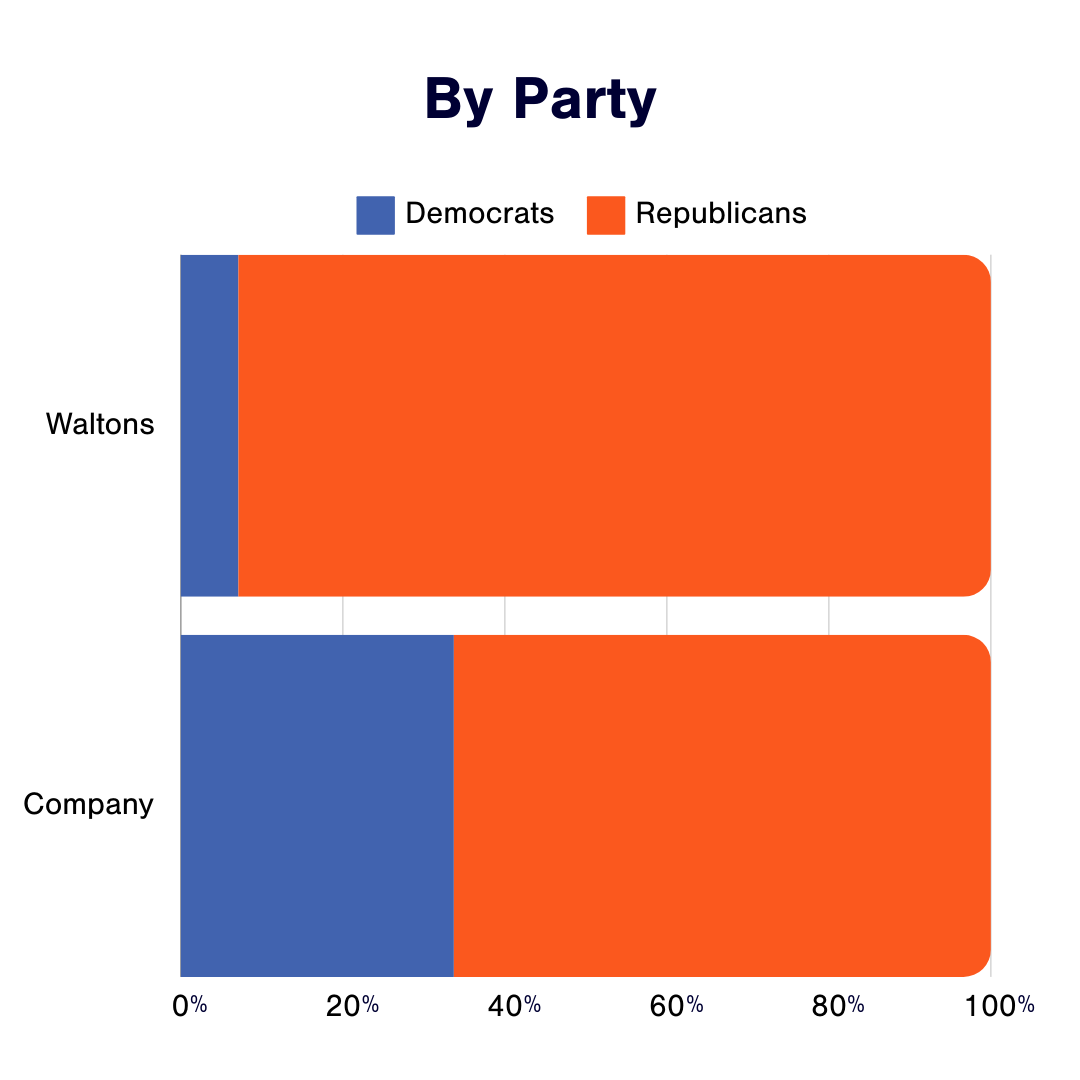
According to polling, most Republicans now believe without evidence that some form of widespread voter fraud put President Biden in office. Across the country, election officials have received death threats and harassment, leading to a heightened police presence, mass resignations of election workers, and—in extreme cases—officials’ children forced into body armor. Experts fear election deniers may bomb drop boxes, intimidate voters, disrupt the vote count, and become increasingly violent. The Brennan Center for Justice has thus warned election denial “poses an ongoing threat to U.S. democracy.”
After the January 6 attack on the Capitol, hundreds of major corporations promised to stop funding supporters of election denialism. Walmart announced it would “indefinitely suspend contributions to those members of Congress who voted against the lawful certification of state electoral college votes.” According to ProPublica, “[i]t took Walmart 390 days” to break this vow.
According to data posted by States United Action, we find that in the current election cycle Walmart and the Walton family have donated at least $885,900 to election deniers. (Walmart donated $529,100 and the Waltons donated $356,800.) Note that this figure is likely a significant undercount as comprehensive election denier data is only available for seven states. (States United Action has published research on election deniers at the federal level, for all statewide offices, and for all state legislative races in seven swing states.) For the universe where data are available, Walmart and the Waltons donated $3.42 million. The $885,900 given to election deniers thus represents more than one out of every four dollars given.
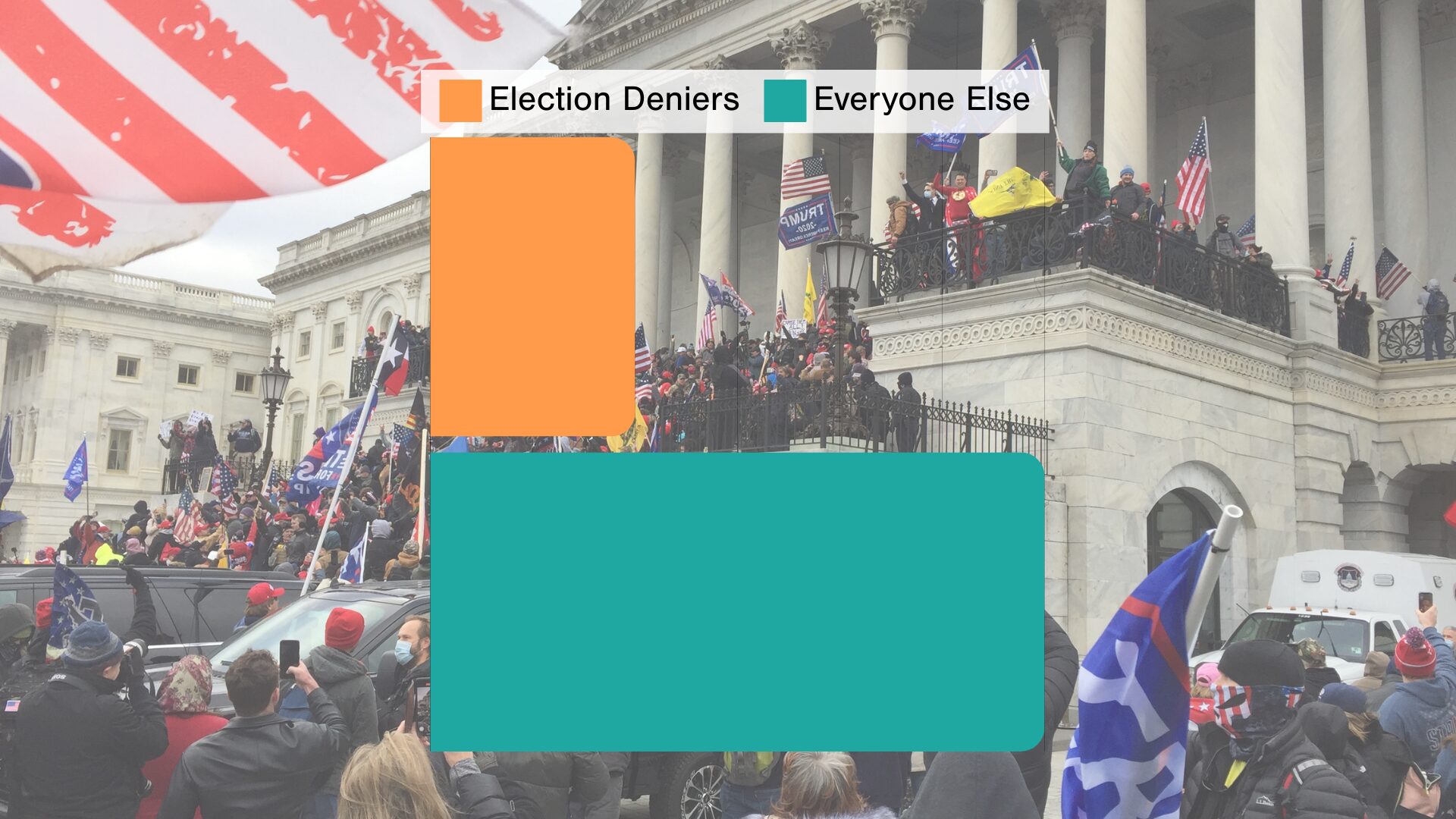
Here are the top election denier beneficiaries:
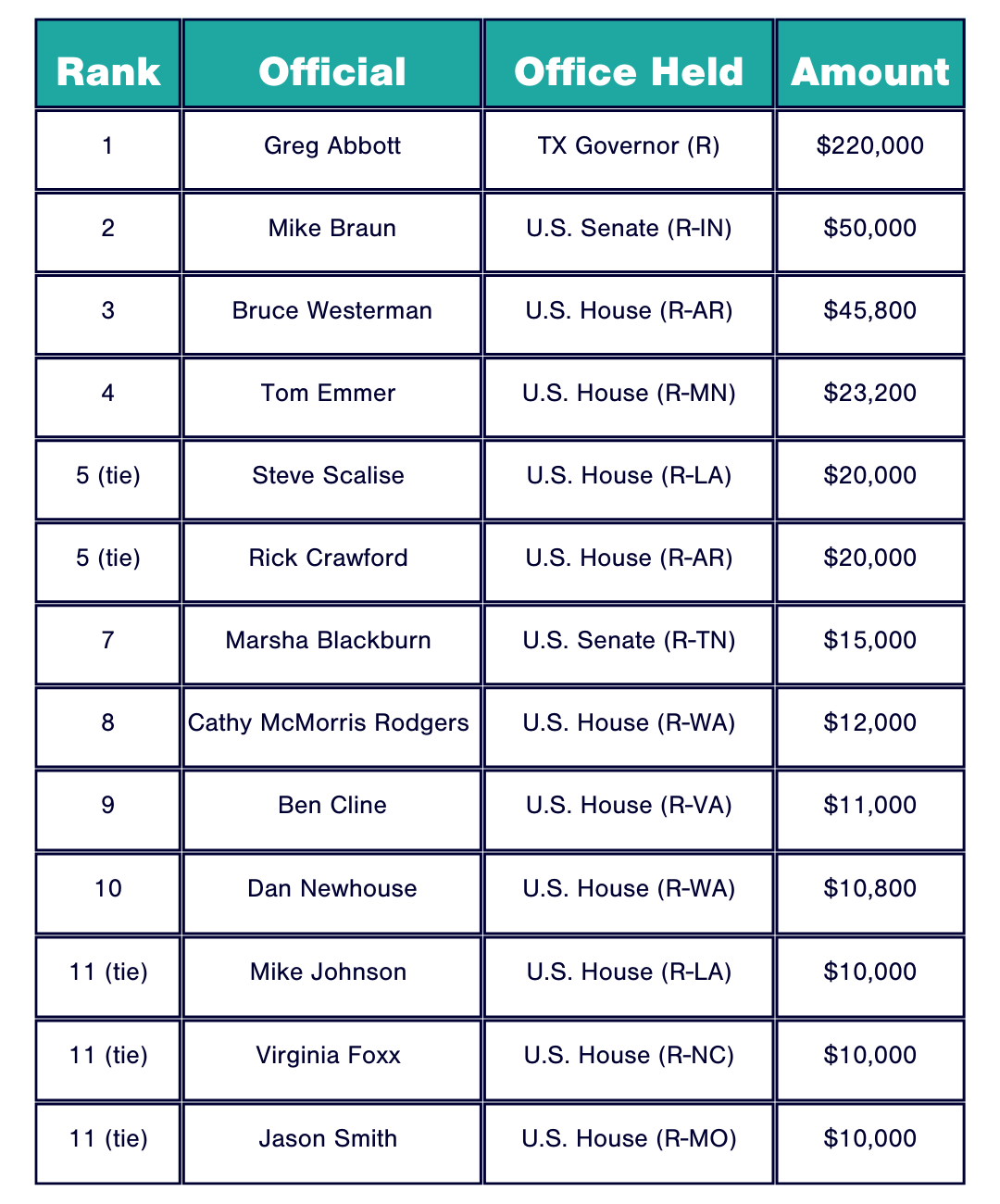
In 2022, United for Respect Education Fund released a report scrutinizing the retail industry’s complicity in overturning Roe v. Wade, in part, due to political contributions companies made to anti-abortion candidates and committees in the years leading up to the historic June 2022 SCOTUS ruling.
Walmart and the Walton family have continued to support state-level candidates and office holders who are determined to restrict access to reproductive healthcare and the fundamental right to bodily autonomy. Combined, they have funneled a total of $824,000 this election cycle to current and former Republican governors responsible for promoting, enacting and defending draconian laws and ballot initiatives severely restricting access to abortion. The Walton family overwhelmingly dominates contributions in this category, collectively donating $736,300—an impressive 89% of the total.
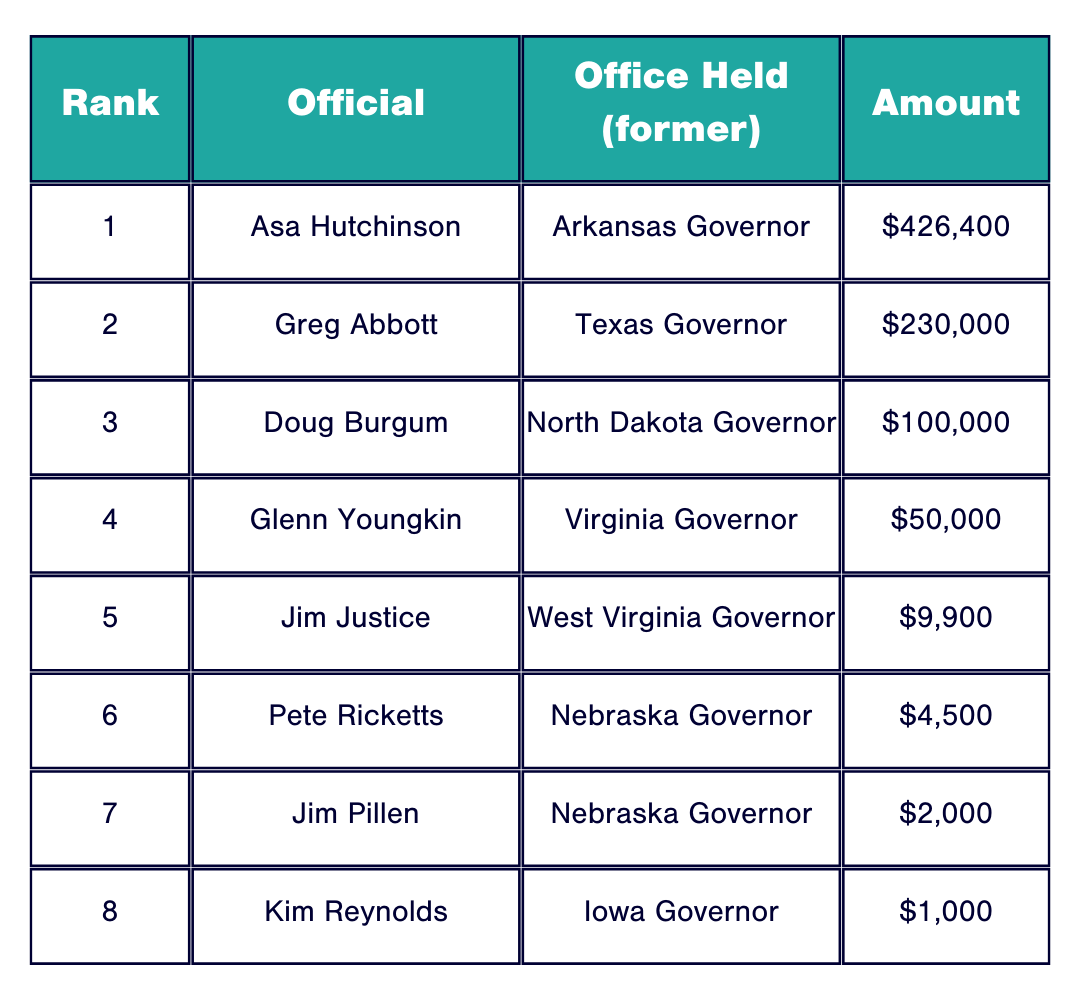
Former Arkansas Governor (and 2024 presidential candidate) Asa Hutchinson is the biggest beneficiary in this category. As Governor in 2021, Hutchinson signed a near-total abortion ban into law that did not include exceptions for rape and incest, and during his short-lived presidential campaign said he would sign a federal abortion ban, with exceptions, if elected.
Texas Gov. Greg Abott, though not up for re-election until 2026, is the second largest beneficiary in this category. In September 2021, Abbott signed what was, at the time, the strictest anti-abortion law in the country, banning abortion after six weeks of pregnancy and allowing private citizens to sue abortion providers and people who “aid and abet” those trying to obtain an abortion.
In April 2023, North Dakota Gov. Doug Burgum signed legislation banning abortion, with few exceptions, up to six weeks of pregnancy. The law explicitly prohibited rape and incest victims from getting abortions after six weeks. Subsequently, a North Dakota judge struck down the ban, ruling it unconstitutional. The decision is expected to be appealed against.
Virginia Gov. Glenn Youngkin vetoed four reproductive health bills in April 2024 that would have protected abortion care providers’ licenses and shielded those assisting with abortion from extradition. While Youngkin previously advocated for a 15-week ban in the state, Virginia law currently allows abortion up to 27 weeks of pregnancy.
West Virginia Gov. Jim Justice signed a law banning abortions at all stages of pregnancy in September 2022, with exemptions for medical emergencies and victims of rape and incest, making West Virginia the second state to enact an abortion ban post the Dobbs decision overturning its constitutional protection.
In May 2023, Nebraska Gov. Jim Pillen signed a 12-week abortion ban into law, which was upheld by the state Supreme Court in July 2024. Former Nebraska Governor, now U.S. Senator Pete Ricketts is bankrolling a conservative ballot measure to amend the state constitution to ban abortion after the first trimester (or 13 weeks of pregnancy).
In July 2023, Iowa Gov. Kim Reynolds signed a 6-week abortion ban that went into effect in July 2024 after the Iowa Supreme Court denied Planned Parenthood’s petition for a rehearing.
United for Respect compiled Walmart and Walton donations from several sources:
- Walmart’s PAC files monthly reports with the Federal Election Commission. These reports list all federal contributions and some state-level contributions. The 21 monthly reports filed in 2023 and 2024 (with contributions through September 30, 2024) list $2,627,025 in contributions (net of refunds) across 1,653 transactions.
- Walton contributions were compiled from FEC contributor data since January 1, 2023, accessed September 15, 2024. (Walton donation confirmed via address and occupation.) Seven Walton heirs gave $21,990,900 in 186 transactions.
- Additional state-level contributions (for Walmart and the Waltons for the 2023-2024 cycle) were provided by Open Secrets at Follow the Money, accessed September 9, 2024. Out of an abundance of caution, United for Respect discarded part of the FTM data that appeared to partially duplicate the PAC’s FEC reporting: $700,045 in candidate contributions were removed. For Walmart, this left $411,500 to party committees and $144,450 to officeholders. The Waltons gave $973,350.
- Additional state-level contributions were taken from California Secretary of State contribution data on October 22, 2024. Since January 1, 2023, Walmart has contributed $4,304,840 in 75 transactions and the Waltons have made five contributions totaling $1,549,000.
- Complete data are available for review in the accompanying spreadsheet.
Notes on coding and categorization:
- Party affiliation was assigned to party committees, individual politicians, and the Leadership PACs aligned with individual politicians.
- Party PACs are affiliated with a national or state party. Issue PACs are those PACs not classified as Leadership or Party PACs.
- Donations to Independent U.S. Senators King and Sinema were coded Democratic.
- Donations to an Arkansas judicial race were not given a party coding.